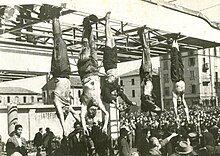The Russian Federation has amassed a large army on the border of Ukraine and threatens to invade unless the US and NATO make concessions including the withdrawal of forces from Eastern Europe, securing Moscow a broad sphere of influence. There has been much hand-wringing in Western media: will Putin invade or is this just a ruse designed to extract concessions?
If we look past the uncertainty, it is clear that an increasingly over-confident Putin has entered a trap of his own making.
The West is faced with an ultimatum: either concede or Russian forces will invade Ukraine.
But every problem presents an opportunity.
The more aggressive Russia becomes, the stronger NATO gets.
Russian actions have united Western alliances, with even long-term neutrals Finland and Sweden, moving closer to NATO. Both Finnish and Swedish presidents reiterated their right to join NATO in response to the Russian ultimatum.
Germany has long obstructed a stiffening of NATO defenses, increasing its vulnerability to Russian energy blackmail by shuttering nuclear power plants and supporting the Nordstream 2 gas pipeline across the Baltic Sea. But opposition is growing. A recent poll shows that the percentage of Germans who trust Russia has fallen by 11% over the past two years:

Concessions are unlikely, simply because there is nothing to gain from them. Concessions by the US would weaken NATO and encourage the Kremlin to make even more outlandish demands in the future. Concessions by NATO without the US would produce a similar outcome.
Russian invasion of Ukraine would be a strategic mistake.
First, invasion would be a flagrant act of war, removing the cloak of deniability that has covered Russian operations in the Donbas region. A formal state of war would increase the flow of Western technology and weapons into Ukraine as Western leaders are required to openly acknowledge Russian aggression.
Land invasions are costly in terms of both blood and treasure. The Russian army may eventually overrun the Ukrainians through the weight of forces and technological advantages. But Ukrainian armed forces have been in a protracted war in the East and are well-trained and equipped with modern anti-tank weapons, artillery and unmanned drones. The costs would be high.

Turkey’s Bayraktar Unmanned Armed Combat Drone – Source: Ukrinform
Where the Ukrainians are at a disadvantage is in air defenses and vulnerability to long-range missile attacks. But that window is closing.
To stiffen Ukraine’s ability to resist, the United States and NATO have dispatched teams in recent weeks to survey air defenses, logistics, communications and other essentials. The United States likely has also bolstered Ukraine’s defenses against Russian cyberattacks and electronic warfare. (David Ignatius, Washington Post)
An air campaign would also achieve little without a follow-up land invasion.
Even if the Ukrainian forces are defeated, that is where the real problem starts. Occupation is a costly and morale-sapping exercise as the Soviets discovered in Afghanistan in the 1980s and the US discovered in Vietnam, Iraq and Afghanistan (they’re slow learners). An insurgency negates the occupiers’ advantages in air power and technology, leading to a drawn-out campaign with no outcome.
“You have the watches. We have the time.” ~ Taliban fighters in Afghanistan.
A Russian occupation force would require 20 combatants for every 1,000 Ukrainians, according to a formula devised by Rand Corp. analyst James Quinlivan in 1995. That would translate into an a required Russian force of almost 900,000, illustrating the impracticality.
We could expect a Russian occupation to be exceedingly brutal, along the lines of Syria, creating a humanitarian crisis and flooding the West with refugees. But that is only likely to harden resolve, marginalizing appeasers in the West, and increase support for the insurgents.
The cost of an extended Russian campaign would deplete the Russian Treasury, even without increased sanctions. It would also escalate opposition within Russia, spurred by the high cost in lives and deteriorating living conditions. The result would threaten collapse of the Russian state in much the same way as the campaign in Afghanistan led to the eventual disintegration of the Soviet Union.
Conclusion
The threat of armed invasion of Ukraine is a mistake. It is likely to strengthen resolve in the West and, if the threat is carried out, result in a long, protracted war in Ukraine. The cost in both blood and treasure would threaten to topple the Russian state.
Russian overconfidence has led them into a trap. Thinly spread across a number of conflict zones, they are vulnerable to an escalation in insurgencies wherever they have “peace-keeping” occupation forces: Syria, Belarus, Ukraine, Moldova, Georgia, and now Kazakhstan. The cost to the West would be low but would exact a huge toll on the Kremlin, depleting their military and already-vulnerable financial resources.
“Moderation in the pursuit of liberty is no virtue.”
~ George Crile, Charlie Wilson’s War: The Extraordinary Story of How the Wildest Man in Congress and a Rogue CIA Agent Changed History











